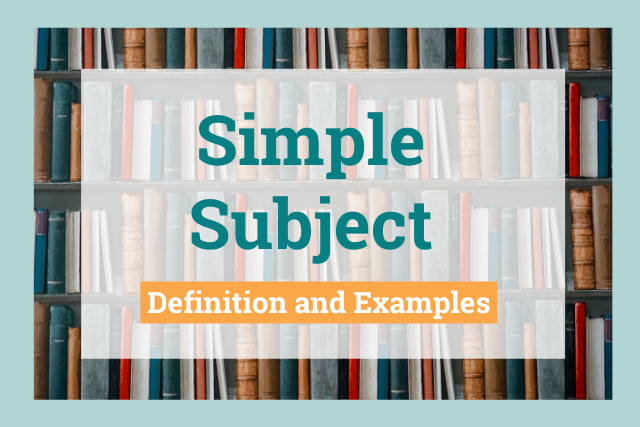
Every sentence has a simple subject and a complete subject.
The simple subject refers to the main noun or pronoun in a sentence, while a complete subject includes the main word and any modifiers.
Today, we’re breaking down what exactly a simple subject is and how to identify it in a sentence.
What Is the Simple Subject?
In order to understand what a simple subject is, we need to understand the parts of a sentence.
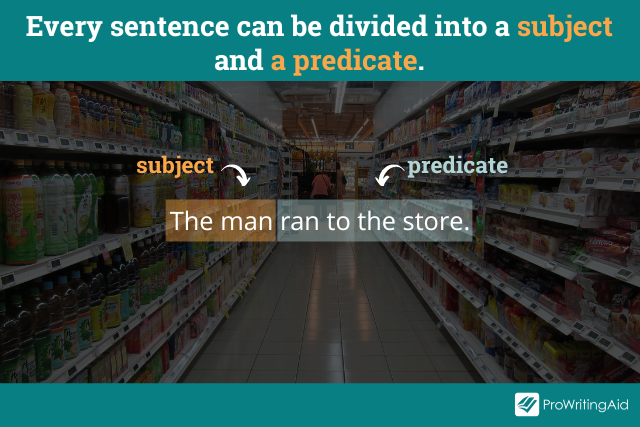
Every sentence can be divided into a subject and a predicate. The subject is who or what a sentence is about. The predicate refers to the part of the sentence that contains the verb.
The subject contains a noun or noun phrase, but there are sometimes nouns in the predicate, too. So, how do you tell the difference?
The noun or noun phrase that is “doing” the verb is the subject.
Let’s look at an example of a subject and a predicate. The subject is in bold, and the predicate is highlighted.
- The man ran to the store.
The verb “ran,” and everything after it, is the predicate. Predicate nouns, like “store” in this example, are not what the sentence is about. The man is the one running, so he is the subject.
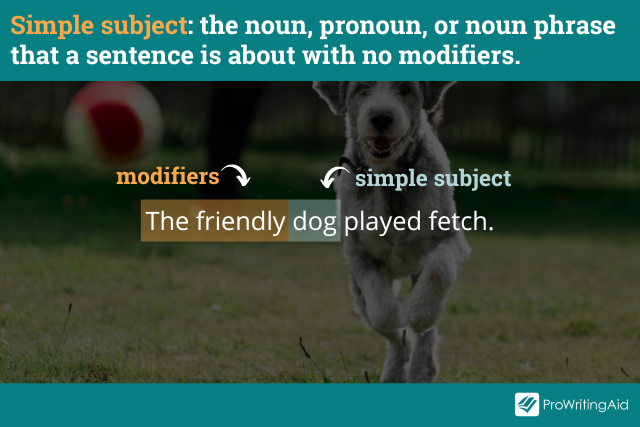
Now that you know what a subject is, we can discuss simple subjects vs. complete subjects. The simple subject only refers to the main word without modifiers.
A complete subject refers to the simple subject plus any modifiers, which might be articles, adjectives, or even phrases.
In our previous example, “man” is the simple subject. “The man” is the complete subject.
What Is the Simple Subject of the Sentence?
To find the simple subject in a sentence, you must eliminate extra words to find the “who” or “what.”
Here’s another example with the simple subject in bold.
- The friendly dog played fetch.
“The friendly dog” is the complete subject with the extra words “the friendly” modifying the main noun, “dog.” This makes “dog” the simple subject.
It doesn’t matter how many modifiers there are in a subject, the simple subject is always just the noun or noun phrase.
A noun phrase is when a noun involves two or more non-modifying words, like “ice cream.”
The simple subject will tell you whether your subject is singular or plural, so you can make sure it agrees with your verb. Our free grammar checker will ensure your subject–verb agreement is correct every time.

Sign up for a free ProWritingAid account today.
Types of Simple Subjects
Occasionally, simple subjects that are proper nouns are two words, such as a first and last name. Most of the time, however, a simple subject is a single word, either a noun or pronoun.
Sometimes an infinitive functions as a subject, and sometimes sentences use compound nouns. In these cases, the simple subjects are two words.
Let’s look a few words examples of two-word simple subjects:
(Proper noun) U.S. President Abraham Lincoln was elected in 1860.
(Infinitive) To drink fine wine is one of life’s greatest pleasures.
(Compound noun) The cold ice cream tasted refreshing on a summer day.
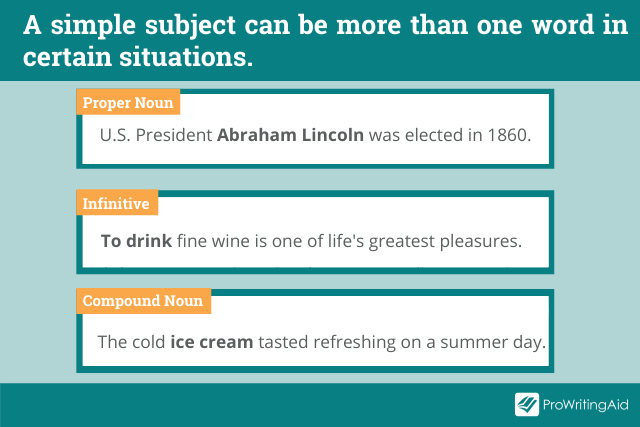
Sometimes, there is more than one subject in a sentence. This is called a compound subject.
A compound subject can have two or more simple subjects, or two or more complex subjects. It can also have simple subjects and a complex subject.
Here’s an example sentence with a compound subject.
- The black cat and the little girl played together all day.
The compound subject is “the black cat and the little girl.” The simple subjects are “cat” and “girl.”
Here’s an example where there is a simple subject and a complex subject.
- Bill and his wife have been married for thirty years.
“Bill” and “wife” are simple subjects. “His wife” is a complex subject.
Now, let’s look at a sentence with three separate subjects.
- My friend Michelle, her husband, and I drove to the movies.
There are three people in this sentence that do the verb meaning that they are all subjects. If we take away the modifiers, we can find each simple subject. The first simple subject is “Michelle,” then “husband,” and finally, “I.”
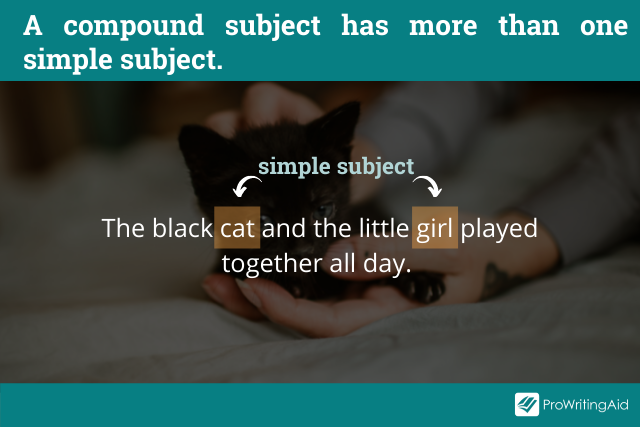
Simple Subject Examples
Now that we know what a simple subject is, let’s practice identifying it in some simple subject examples. The simple subject is bold in each example.
We’ll start with examples with just one simple subject.
- Do the cute babies love story time?
- The bearded man over there is my history teacher.
- Last year, I went on vacation to Acapulco.
- On Saturday, my friends surprised me with a birthday party.
- Despite having a terrible day, Jane went to bed smiling.
- Tortoises move slowly and can live a long time.
- Running is my favorite form of exercise.
Now, let’s look at a few examples where the singular simple subject is multiple words.
- The famous author F. Scott Fitzgerald was part of the Lost Generation.
- When was the Golden Gate Bridge built?
- Carrot cake is my favorite type of cake.
- The Founding Father John Adams was the second president of the United States.
- Every year, the Supreme Court hears cases from October through April.
- To write a bestselling novel is my ultimate dream.
- Neil Patrick Harris is such a funny actor.
Finally, let’s find each simple subject in some sentences with compound subjects.
- Will Mark and Manuel attend the game tomorrow?
- Yesterday, my mom, my older sister, and my three-year-old niece came to visit.
- Whales and dolphins are mammals, not fish.
- Both the bananas and the apples went bad in the fruit basket.
- Did you and your friends have a good time?
- Laundry and mopping are my least favorite chores.
- The Rangers, the Mariners, and the Yankees are all major-league baseball teams.
Once you can identify the simple subject, the rest of the sentence becomes easier to understand.
Remember, the simple subject tells you who or what a sentence is about without any extra words.


